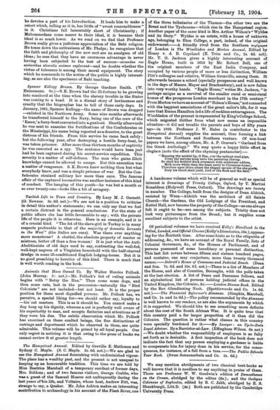Spencer Kellogg Brown. By George Gardner Smith. (W. Heinemann. 6s.)—S.
K. Brown had the ill-fortune to be growing into manhood at the time when the slavery trouble in the States was coming to a head. It is a dismal story of lawlessness and cruelty that the biographer has to tell of these early days. In January, 1861, Spencer Kellogg—the name of Brown was dropped —enlisted in the Northern Army. Some nine months afterwards he transferred himself to the Navy, being one of the crew of the 'Essex,' a ferry-boat converted into a gunboat. Shortly afterwards he was sent to examine the fortifications of the Confederates on the Mississippi, his name being reported as a deserter, to the great distress of his friends. From this service he came back safely; but the following year, after destroying a hostile ferry-boat, he was taken prisoner. After more than thirteen months of captivity he was executed as a spy. The sentence would have been just had he been captured during his secret-service expedition. This severity is a matter of self-defence. The man who gains illicit knowledge cannot be allowed to escape. But this execution was a matter of vengeance. S. K. Brown knew nothing then but what everybody knew, and was a simple prisoner of war. But the Con- federates strained military law more than once. The famous affair of the captured locomotive was another instance of this kind of conduct. The hanging of this youth—he was but a month or so over twenty-one—looks like a bit of savagery.






































 Previous page
Previous page